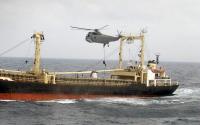Proliferation Security Initiative

Quicktabs: Keywords
The United States should take the lead in developing new practices on the oceans that will at once facilitate commerce and peacetime deployment of warships but also protect our shores from the terrorist scourge. The President’s Proliferation Security Initiative is an example of such modern and creative thinking. This US-led multinational program of high seas interdiction and vessel boarding is barred by the Law of the Sea Treaty yet it is our overriding national security interest to execute. Ratification of the Treaty would effectively gut our ability to intercept the vessels of terrorists or hostile foreign governments even if they were transporting nuclear weapons. We must ensure that we not binding the government of the United States to a legal regime that makes us more vulnerable and trades the lives of our innocent citizens for the sake of participating in yet another unnecessary Treaty.
In addition, some columnists and think tank analysts have argued that U.S. accession to the Convention would interfere with the Proliferation Security Initiative (PSI), under which the United States and more than a dozen allies have agreed to interdict some ships that may present a nonproliferation risk. In fact, the Convention expands the list of justifications for ship interdictions set forth in its predecessor, the 1958 Convention on the High Seas, to which the United States has been a party for more than forty years. Among the many legal bases that may be applicable to interdictions under the PSI are the jurisdiction of coastal states in their territorial seas, the right to board stateless vessels, an agreement concerning high-seas boarding with a flag state (the country of origin of an oceangoing vessel) and the inherent right of self-defense. Indeed several allies have recently expressed concern about the U.S. failure to ratify the Convention, asserting that this failure could weaken the PSI.
